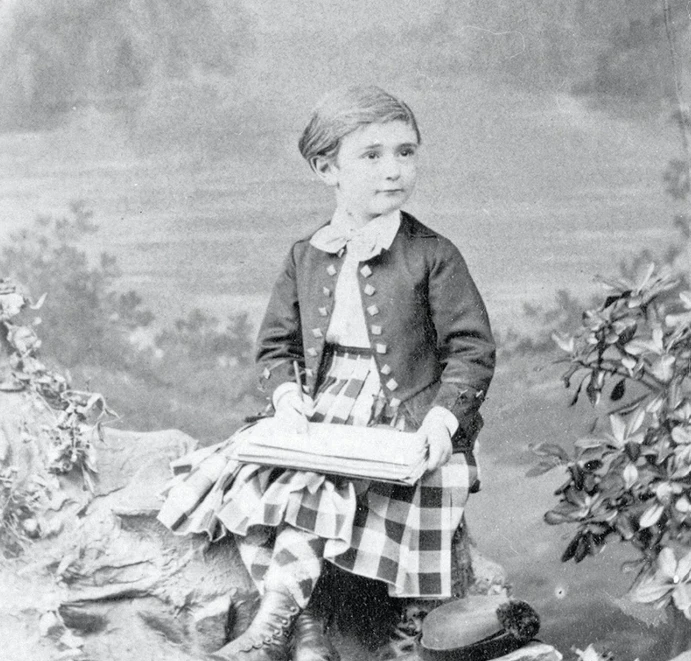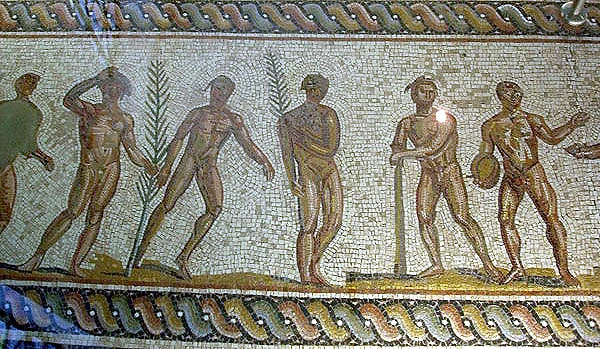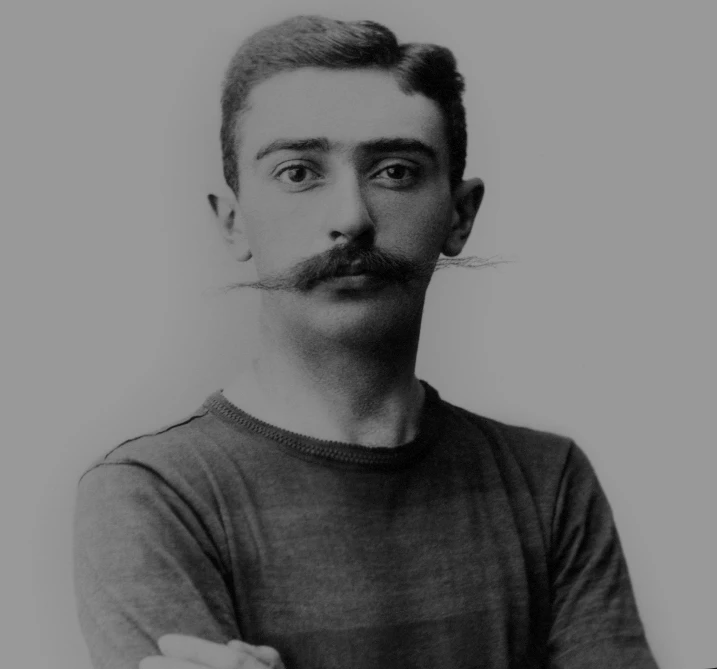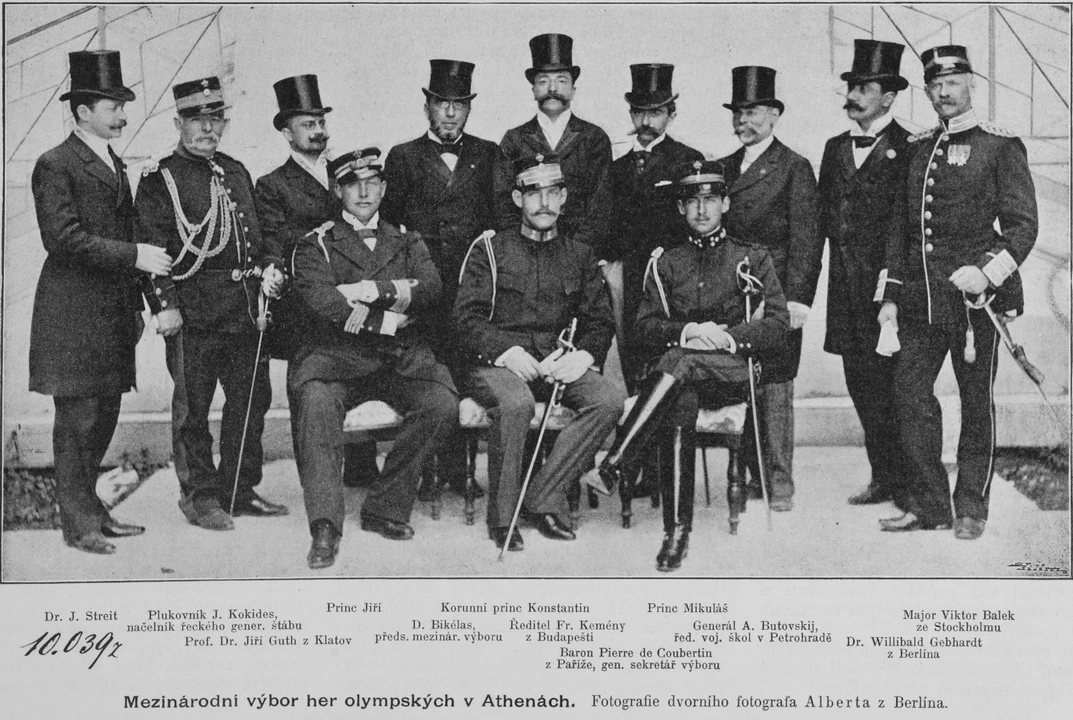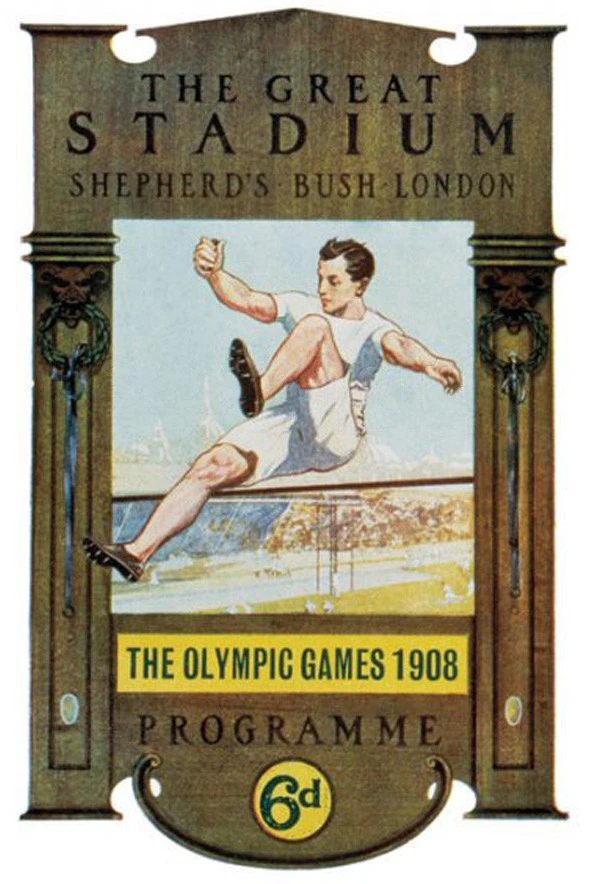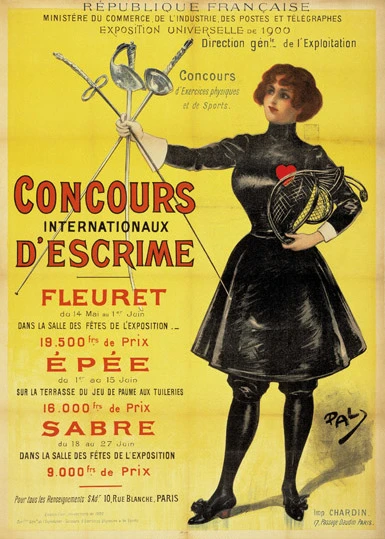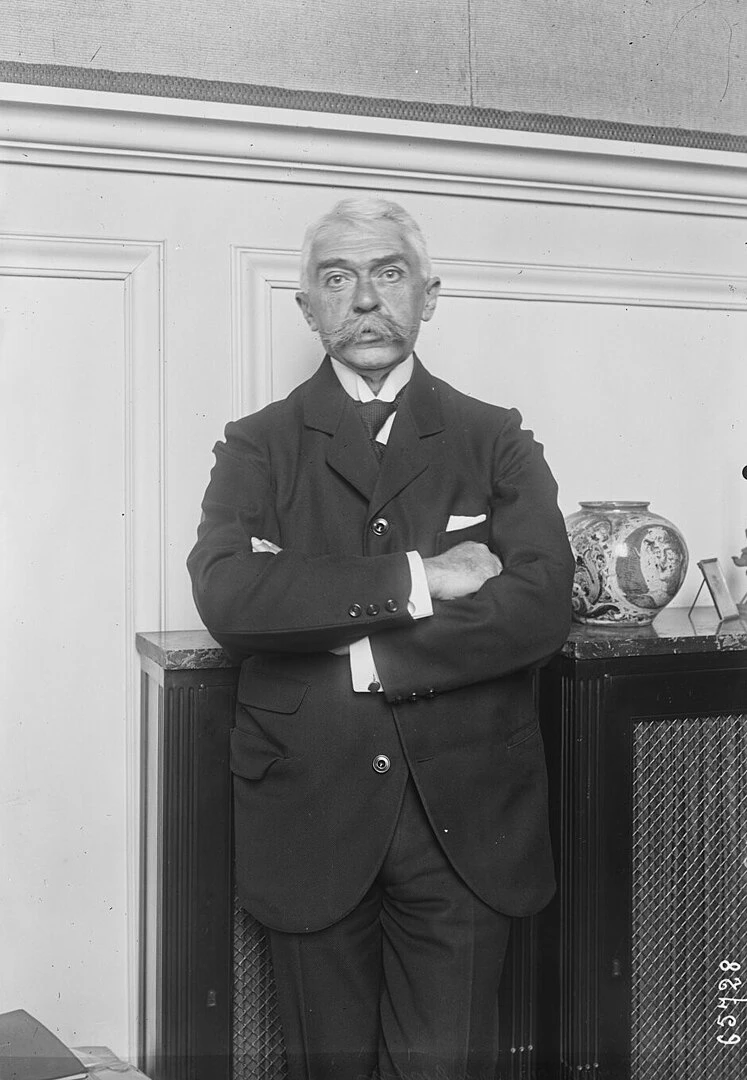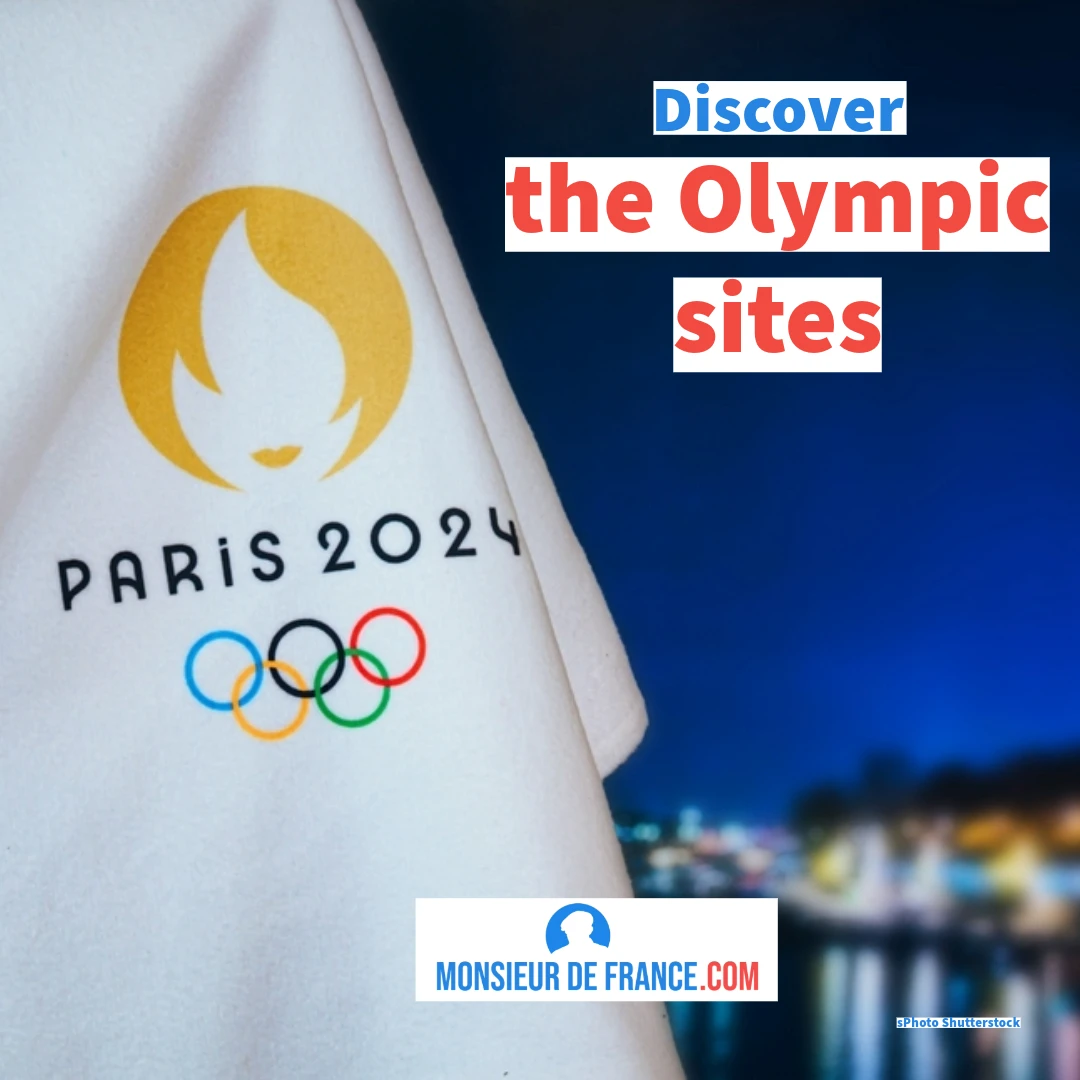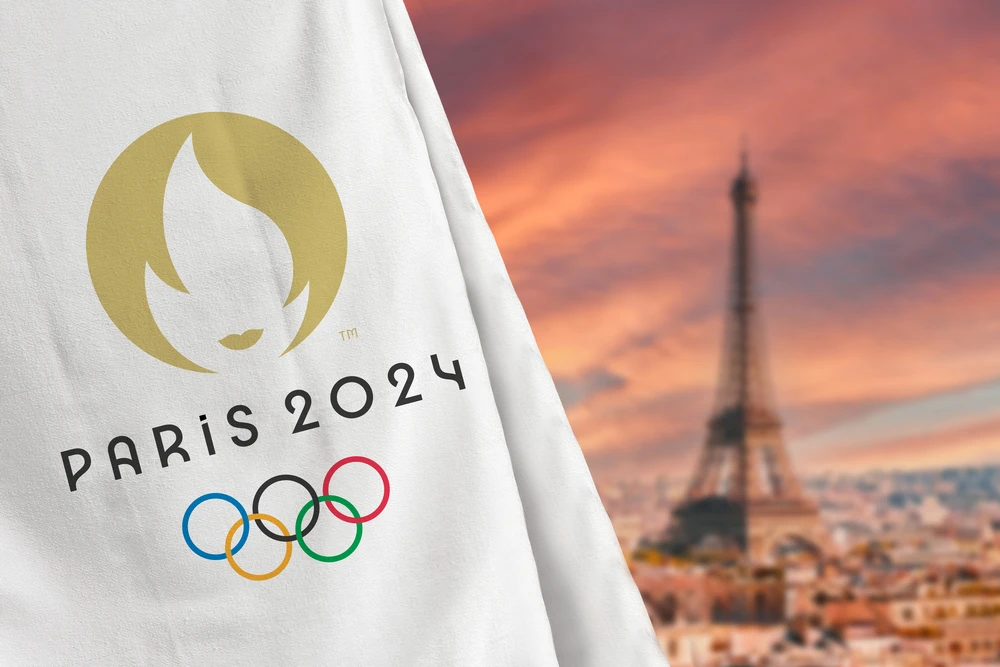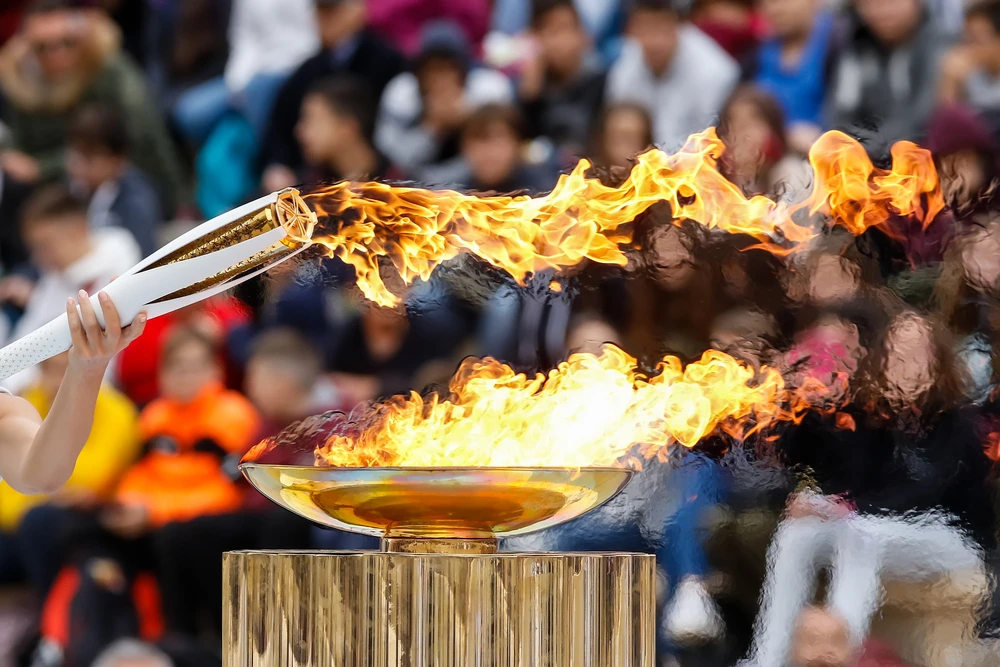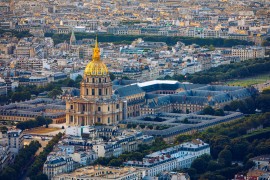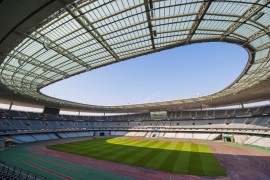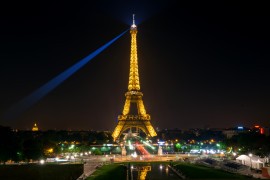Birth of an Olympic destiny
Pierre de coubertin as a child.
A curious child
Born in Paris on January 1, 1863 to an aristocratic family, he is a baron. The de Coubertin family, originally from Rome, has been noble since 1629, with the motto"oir loin, parler franc, agir ferme". Pierre de Coubertin should have been a military man if he had followed in his father's footsteps, but this was not to be. At school, interested in literature and rhetoric, he became acquainted with Greek civilization, which was the basis of literary studies in his day, with Latin.
Olympic athletes on a mosaic found in Olympia, Greece. They can be recognized by the victory palms and laurel wreaths they are wearing. By original file by Tkoletsis - File:Olympic_winners.JPG, CC BY-SA 4.0, https://commons.wikimedia.org/w/index.php?curid=6533448
It was through the books he read at the age of 12 that he learned of the existence of the Olympic Games, which brought together Greek cities from all over the world, every 4 years, on the site of Olympia, for a series of sporting events. This idea left its mark on him, to say the least. It was around the same time that, travelling in Great Britain, he discovered the importance given to sport in English secondary schools. A place that did not exist in France, and this was a great source of regret for the young Pierre de Coubertin, who could see himself combining the study of books with the success of sporting challenges, as English youngsters of the same age did. The Ancient Games and youth sport, two ideas that Pierre de Coubertin would one day put to good use.
And a love of sport
It has to be said that Pierre de Coubertin was very sporty. He practiced horse-riding and fencing, which was normal for a young 19th-century aristocrat, but also boxing and rowing. He excelled at pistol shooting, becoming French champion 7 times (and having the discipline included in the first modern Olympic Games in 1896). Dismissing the army and politics, he threw himself into the study of pedagogy and sociology, while becoming increasingly involved in sports movements. It was at the age of 25 that he proposed a number of dissertations aimed at changing the French way of studying by including sport. He is also deeply involved in sports movements. He is, for example, secretary of the Comité pour la propagation des exercices physiques dans l'éducation and of the Union des sociétés françaises de sports athlétiques.
A young Pierre de COUBERTIN at the height of his pistol-shooting exploits. He would go on to win a gold medal. Photo chosen by monsieurdefrance.com: Official website of the Olympic Committee screenshot.
A crazy idea: make the old Olympic Games a success
It was on November 25, 1892, during a ceremony at the Sorbonne to close the 5th anniversary of the Union des Sociétés Françaises de Sports Athlétiques, that he launched an original idea: the rebirth of the Olympic Games, which had been extinct for just over 1,500 years (the Greek Olympic Games were abolished in 394 AD). The audience was taken aback, but many soon rose to their feet and applauded this young man, not yet 30, who wanted to build something huge that would transcend all divisions in the name of sport. It's one thing to say it, it's quite another to do it. Pierre de Coubertin took more than 4 years to realize his crazy idea: the organization of the first modern Olympic Games .
The Renaissance of the Olympic Games
The Olympic Committee in 1896. Pierre de Coubertin has just been elected President. He is standing 6th from the left. He can be recognized by his "bacchantes", his moustaches. Source de monsieurdefrance.com : wikipedia.
On June 23, 1884, Pierre de Coubertin achieved an important goal: the establishment of the first Olympic Congress and, above all, the proclamation of the reinstatement of the Olympic Games on June 23, 1894. It was then decided that the Games would be held every 4 years. The first president of the International Olympic Committee was Greek, Dimitrios Vikelas (1835-1908), and the first modern Olympic Games were held in the land that had created the Games over 3,000 years earlier: Athens, Greece. On April 6, 1894, they were inaugurated by King George I of Greece. That same year, Pierre de Coubertin became President of the International Olympic Committee. The Paris Games were held in 1900. They crossed the Atlantic and were held for the first time in America, in Saint Louis in 1904, before being launched in London in 1908... Pierre de Coubertin's dream was realized. Just as he had wished, sport shines. In 1912, he wrote: "O Sport, you are Peace! You establish happy relations between peoples by bringing them together in the cult of controlled, organized, self-controlled farce. Through you, universal youth learns to respect each other, and thus the diversity of national qualities becomes the source of a generous and peaceful emulation".
The official poster for the 1908 London Olympics. It was in this year that the Marathon was launched. Its length, which enabled it to reach the Royal Box, has remained unchanged ever since. Photo chosen by monsieurdefrance.com: Wikipedia.
A man with his faults.
That said, Pierre de Coubertin was far from perfect. In 1904, in Saint Louis, the Games were a flop. There were very few foreign athletes, so the Americans took everything, and spectators shunned the event (the 15,000-seat Olympic stadium was virtually empty). Above all, black American athletes were not allowed to participate. Games were set up for "representatives of savage and uncivilized tribes", with stone-throwing contests, for example. A very colonial vision shared by Pierre de Coubertin. And then there's the place of women. The founder was resolutely against the Olympic Games being open to women, and he said so himself : "A female competition would be uninteresting and unsightly. The role of women should be above all to crown the winners". Nevertheless, women took part in the Games for the first time in 1900, despite the founding president's mysogyny.
Women appeared on the poster for the 1900 Paris Olympic Games. They could take part, which did not please Pierre de Coubertin.
President of the Olympic Committee for nearly 30 years
Pierre de Coubertin became President of the International Olympic Committee in 1896, and remained so until 1925. A year before resigning, he launched the Olympic Winter Games, also held every 4 years, with the first edition in Chamonix, France, in 1924. It was he who ensured that Lausanne became the Olympic Capital and headquarters of the Committee during the First World War, on a provisional basis and then definitively afterwards. He was rather embittered when he left the Games, and even afterwards, notably when his successor opened the Games to women in athletics, something Coubertin had always opposed. The author of numerous works on sociology, history, sport and politics, as well as a journalist, Pierre de Coubertin died on September 2, 1937 in Geneva, where he had retired.
Pierre de Coubertin in 1921. At the time, he was still President of the International Olympic Committee. By Agence Rol - This image comes from the Gallica online library.
Pierre de Coubertin's footsteps today
Which recalls his memory:
In France, Pierre de Coubertin gave his name to27 schools, 45 sports venues (stadiums, etc.), over 600 roads (streets, avenues, boulevards, etc.) and even a bridge inaugurated in Toulouse in 1969. The de Coubertin Medal is the Olympic Committee's highest distinction.
Pierre de Coubertin quotes.
He came up with the Olympic motto "Stronger, higher, faster" .
He said, of course,"the important thing is to take part", but the full sentence is much more complete: "The most important thing in the Olympic Games is not to win but to take part, because theimportant thing in life is not the triumph but the fight; the essential thing is not to have won but to have fought well".
And he also wrote: "Every difficulty encountered must be an opportunity for new progress".
Paris 2024: the Olympic symbols
The flag
It was Pierre de Coubertin who designed the symbol of the Games: the famous 5 interlaced Olympic rings , which appeared under his pen in 1913. They symbolize the 5 continents. Although Coubertin never precisely associated a color with a continent, it is said that green symbolizes Oceania, black Africa, yellow Asia, blue Europe and red America. However, this theory is not validated by the International Olympic Committee, which simply explains that these colors are found in the flags of the continents concerned. This is confirmed by Baron de Coubertin, who wrote: "The Olympic flag, as we know, is all white with five intertwined rings in the center: blue, yellow, black, green and red; the blue ring at the top left next to the flagpole. Thus designed, it is symbolic; it represents the five parts of the world united by Olympism, and its five colors reproduce those of all the national flags flying throughout the universe today".
The Olympic flag and its 5 rings. Photo chosen by monsieurdefrance.com: dépositphotos.com
The official languages of the Olympic Games are
The two official languages of the International Olympic Committee are French and English, and this is enshrined in Article 23 of the 1972 Olympic Charter, which also stipulates that during sessions, debates must be translated into German, Spanish, Russian and Arabic. In the event of any disagreement over a text, the French text will prevail. This is a sort of tribute to Pierre de Coubertin, but also to the fact that it was in France that the Modern Olympic Games were born. During the opening ceremonies, the participating nations are announced in French and then in English.
What is the Olympic motto?
Written by Pierre de Coubertin, the motto of the Olympic Games is "Citius, Altius, Fortius" in Latin, meaning "faster, higher, stronger".
Where does the Olympic flame come from?
It was officially born on July 28, 1928, at the Amsterdam Olympic Games. The Greeks didn't perform this ceremony, but sacred fires blazed in temples, including that of Olympia, the city where the games were held. It is in this city, to recall the Greek heritage of the games, that the flame is lit for each edition. It is lit using solar energy, just as the Greeks used to light a sacred fire. It has also been lit for the Olympic Winter Games since 1952. In 1976, the flame was also lit by laser following a radio signal linking Athens and Montreal. The flame is rarely extinguished. It has been extinguished by thunderstorms at the Montreal Olympics in 1976, by the wind in Athens in 2004, and voluntarily in 2008 in protest at China's human rights policy. The flame has already been to the roof of the world, Mount Everest, at an altitude of 8849 metres, enclosed in a kind of miner's lamp to prevent the lack of oxygen from extinguishing it. She also walked the Great Barrier Reef in Australia during the Sydney Olympics. Finally, she even went into space in the Columbia shuttle in 1996 and the Soyuz spacecraft in 2013.
The Olympic flame in Athens in 2017. Photo chosen by monsieurdefrance.com: vverve via depositphotos
How long has the Olympic Torch Relay been running?
The torch relay was born in 1936 at the Munich Olympic Games in Germany. Its longest journey was 78,000 kms in 2004, thanks to 11,300 torchbearers. In 2024, the flame is lit on April 16 in Olympia. It arrives in Marseille on May 8 to begin its French journey, and lights the Olympic cauldron on July 26, 2024. French designer Mathieu Lehanneur designed the Paris 2024 torch, inspired by equality, water and appeasement, the three values chosen for this edition. 2,000 torches are being manufactured for the relay by ArcelorMittal in Lorraine.

